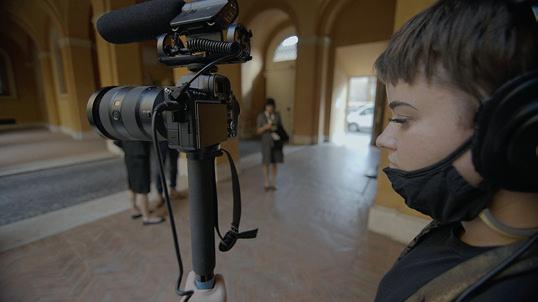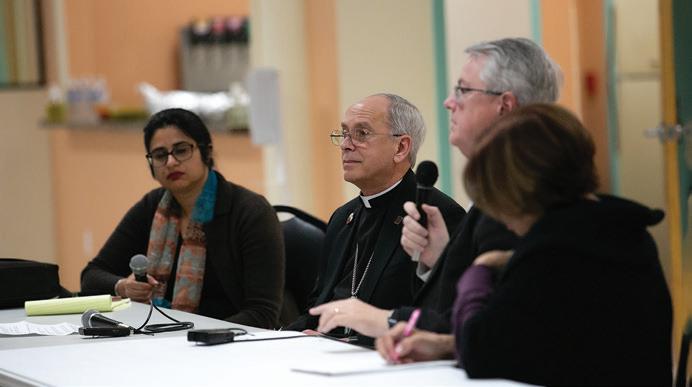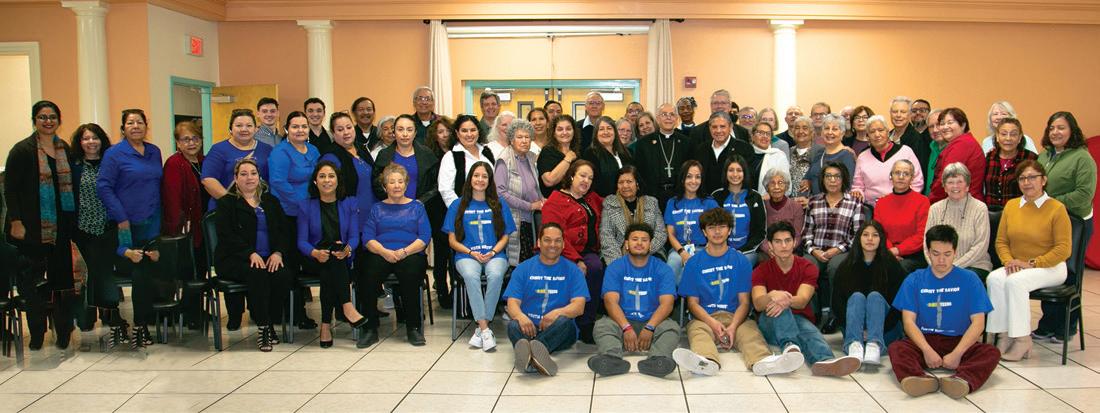offer our witness in service to the church in public. I feel like it is inviting us to walk in a synodal path.”
Her words took my breath away.
I have often understood my experience with religion perhaps unconventionally, joking that I am “religious but not spiritual.”
As a producer, social scientist, and (more often than I would like to admit) pragmatist, often the internal, personal, spiritual part of faith—such as prayer—is difficult for me.
But the external, shared, communal experience of documenting other people’s faith in religious communities has consistently made me feel closest to God. With Lisa’s words, this was the first

Toward a Better Future
BY TIM MCMANUS AND SURYA KALRA
Itime I had ever understood that perhaps sharing one’s story in a documentary could also feel like a spiritual experience.
I will never pretend that there is not an unequal power dynamic between myself as a documentarian and those whom who I am documenting. The care and need to think critically about my position as a documentary filmmaker with participants—especially when I am an outsider—is ever present and complicated. But Lisa’s words reminded me of the beauty and holiness of the exchange; that witnessing and being witnessed to could be a spiritual experience for those of us on both sides of the camera, in community with one another. I didn’t have to feel like an outsider in this church, because God had a role for me here, too.
What is more synodal than that?
For more information about the QUERIDA documentary, visit wmm.com/sponsored-project/querida-working-title
Christine Delp is a documentary filmmaker and a doctoral candidate in sociology at the University of Minnesota, where she holds a National Science Foundation fellowship. Her work has been supported by Sundance Institute, Tribeca Film Institute, Field of Vision, and others and has been broadcast internationally on platforms such as HBO, PBS, and Al Jazeera. For more information, please visit falconparkpictures.com

n 2018, the West/Southwest region of the Industrial Areas Foundation (IAF) launched an ambitious project to partner with local dioceses in the development of lay leaders, particularly immigrants and those on the margins. To date, this strategy, called “Recognizing the Stranger,” has involved 21 dioceses and trained 5,000 lay leaders in the habits and practices that lead to listening, conversation, and building bridges that bring Catholic teaching more fully into public life.
Many bishops, including Bishop Mark Seitz of El Paso, Texas, and Bishop Daniel Garcia of Monterey, California, recognized the connection between this initiative and Pope
Francis’ global synod process and invited us to partner with them. In each instance, IAF worked closely with the bishop and synod coordinators to prepare parish leaders to conduct robust, face-to-face synod listening sessions. Historically, community organizing has been rooted in the belief in the capacity of people to come together in action that moves their communities closer to a common good. This involves thousands of conversations about what is happening in a community and what is to be done, and it requires a space for this process to unfold. Through parish organizing, IAF leaders and organizers have learned to patiently and with commitment engage in careful listening to create the type of
Article photos courtesy of Surya Kalra
4
Above: A behind-the-scenes photo of Christine Delp filming a documentary in Rome during the Synod on Synodality. Page 6: Casey Stanton of Discerning Deacons appears in a still from Christine Delp's upcoming documentary.
7 A MATTER OF SPIRIT
“When you take responsibility for a situation, it touches your heart, and you must move forward.”
—Pope Francis

IAF members host parish listening groups to help people engage more deeply in the synodal process.
“productive tension” to which Pope Francis has called the church. This allows us to walk together toward a better future.
To support the synod process, we taught parishioners to build a diverse, strong team of leaders from different ministries, Masses, and demographics. These teams connected with people from the many different sectors of a parish, moving beyond the already engaged and active leadership and reaching the peripheries. This made it possible for larger participation in the synod, not just from within a parish but also from those feeling disconnected from the church.
The next phase of training involved learning to lead synod conversations. In organizing, we refer to similar small group conversations as “house meetings.” While house meetings (which can take place anywhere, not just in someone’s home) help surface concerns in a community, their real worth is in creating a space for future leaders to emerge. As people discuss what is happening around them, those who want to make change step forward. As we trained teams to actively listen and guide people through the synod questions, we taught them how to look for people interested in acting on their concerns. Finally, we stressed the importance of evaluation. We asked teams to reflect on how the process went, what they learned, and especially who emerged as leaders through their conversations.
Experienced leaders from our local organizations also benefited from participation in the synod. They gained a deeper appreciation for the church and began to integrate organizing into their faith experience. In the Monterey Diocese, two Spanishspeaking Catholic immigrant leaders—Maricela Acevedo from King City and Adriana Molina from Castroville—began
to engage more deeply in their local parish after helping with synod training. They built working relationships with their pastors, became involved in leadership at the parish level, and eventually got their parishes formally involved in community organizing.
In many dioceses, the synod sessions led to concrete local action. At Christ the Savior Catholic Church in El Paso, young people, who felt they had no voice or space in the church, joined with caring adults to form a youth ministry program. A team developed at the parish and began reaching out to parents of children in the religious education program and are now forging relationships with local schools to address mental health concerns.
In October 2022, 20 IAF leaders and organizers were invited to visit with Pope Francis in his residence so he could learn more about this work. When we shared what we had done, Pope Francis said, “Cuando escucho me hago cargo. Cuando vos te haces cargo de una situación, te toca el corazón y tienes que ir adelante.” (“When you listen, you take responsibility. When you take responsibility for a situation, it touches your heart, and you must move forward.”) As we continue both the synodal listening process and the day-to-day work of organizing, Pope Francis’ words resonate deeply and compel us to keep walking together.
Tim McManus is a Senior IAF Organizer based in Dallas, working with IAF organizations in North Texas, Arizona, and the Central Valley of California. Surya Kalra is the IAF Lead Organizer with EPISO/Border Interfaith in El Paso, Texas.
SPRING 2024 • NO. 141 8
Article photos courtesy of Surya Kalra



